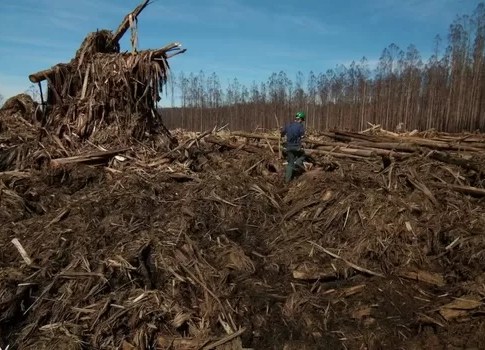Federal MPs, an Olympic champion and acclaimed authors are among dozens of high-profile names urging the Tasmanian government to end to native forest logging and reinvest the money into housing, health and education.
Independent federal MPs Zali Steggall, Zoe Daniel and Dr Sophie Scamps, Olympic legend Ian Thorpe, renowned authors Richard Flanagan and Tim Winton, and 2017 Australian of the Year Tim Flannery have put their names to the open letter calling on Premier Jeremy Rockliff to protect Tasmania’s native forests.
The 67 signatories to the open letter, published in The Mercury and The Examiner on Thursday, say successive state governments have provided more than $1 billion in subsidies to the forestry industry over 20 years, money better spent on building new homes, and supporting essential services such as nursing and teaching.
Actors Claudia Karvan, Essie Davis and Miriam Margolyes, former federal Greens leaders Bob Brown, Richard Di Natale and Christine Milne, Violent Femmes bassist and MONA music director Brian Ritchie, and Lime Cordiale lead singer Oliver Leimbach have also signed on.
The open letter praised Victoria’s move to ban native forest logging from 2024 and urged Tasmania to follow suit in a win-win for the environment and economy. The majority of Tasmania’s native forests end up as wood chips and waste, while plantation pine is used for housing frames.
Blue Derby Wild is a grassroots campaign working to protect Tasmania’s native forests and Director Louise Morris is among the open letter signatories. Tasmania and NSW are the only states still dragging the chain on ditching native forest logging.
‘While other states across Australia are ending native forest logging and transitioning to a plantation based industry, the Tasmanian government is talking up removing 356,000ha of our native forests from reserves to be logged,” Ms Morris said.
“This is while the Supreme Court case brought about by Blue Derby Wild claiming systemic unlawful logging is still before the courts, and casts a serious shadow over the way in which the government oversees native forest logging in Tasmania.”
Census figures from 2021 showed just 885 people are working in forestry and logging in Tasmania. This includes plantation forestry. Meanwhile, there were 2,300 workers across all forestry, logging, wood product and paper manufacturing industries, amounting to just 1 per cent of all Tasmanian jobs.
Another open letter signatory, Dr Jennifer Sanger, who is cofounder of forest advocacy group The Tree Projects, says these workers must be supported to transition to jobs with a future such as forest rehabilitation, management and hazard mitigation.
“We need to start planning for the future by investing in plantations and other industries such as nature-based tourism. Let’s not miss out on this opportunity to create sustainable jobs for our regional communities,” she said.
“It’s time that Tasmania ends native forest logging. We need to follow Western Australia and Victoria and protect our forests. Native forest logging is the highest emitting sector in Tasmania and is the main reason that the critically endangered swift parrot is heading towards extinction.”
“Australians want to see native forests protected and are calling on the Tasmanian government to put a stop to this unsustainable industry. This can be done by supporting forestry workers to move into sustainable jobs that help, not harm, the environment,” The Australia Institute’s Tasmania Director, Eloise Carr, said.
“Native forest logging cannot go on. Tasmania needs to be on the front foot and should make the inevitable decision now.”
“Tasmania has been handed a golden opportunity to protect its native forests by closing the curtain on this economically and environmentally unsustainable industry,” Ms Carr said.
“Australia Institute research over many years has highlighted the financial and economic losses of native forestry. The sector is a relatively small employer, heavily subsidised by the taxpayer and it causes climate change and habitat loss.”
Logging reduces carbon storage, threatens native species and increases fire hazard as Australia heads into another El Nino, which brings renewed bushfire risk after years of heavy rain.
“The end of native forest logging is long overdue and Tasmania’s environment cannot afford the State Government delaying the inevitable end of an industry well past its use-by date,” Ms Carr said.
“With Victoria today bringing forward its native forest logging ban to 2024, Tasmania and NSW are the only states dragging the chain,” Ms Carr said.
“If the Tasmanian Government ended native forest logging it would not just good environmental policy but good economic policy.”
Related stories
The Truth About Richard Denniss and The Australia Institute
Australia’s Billion-Dollar Fossil Fuel Subsidies
A forestry primer: The opportunity for Australia’s native forests
Gas Price Crisis: Australians Want a Government Intervention
Truth in Political Advertising Laws needed
Advertisement:




